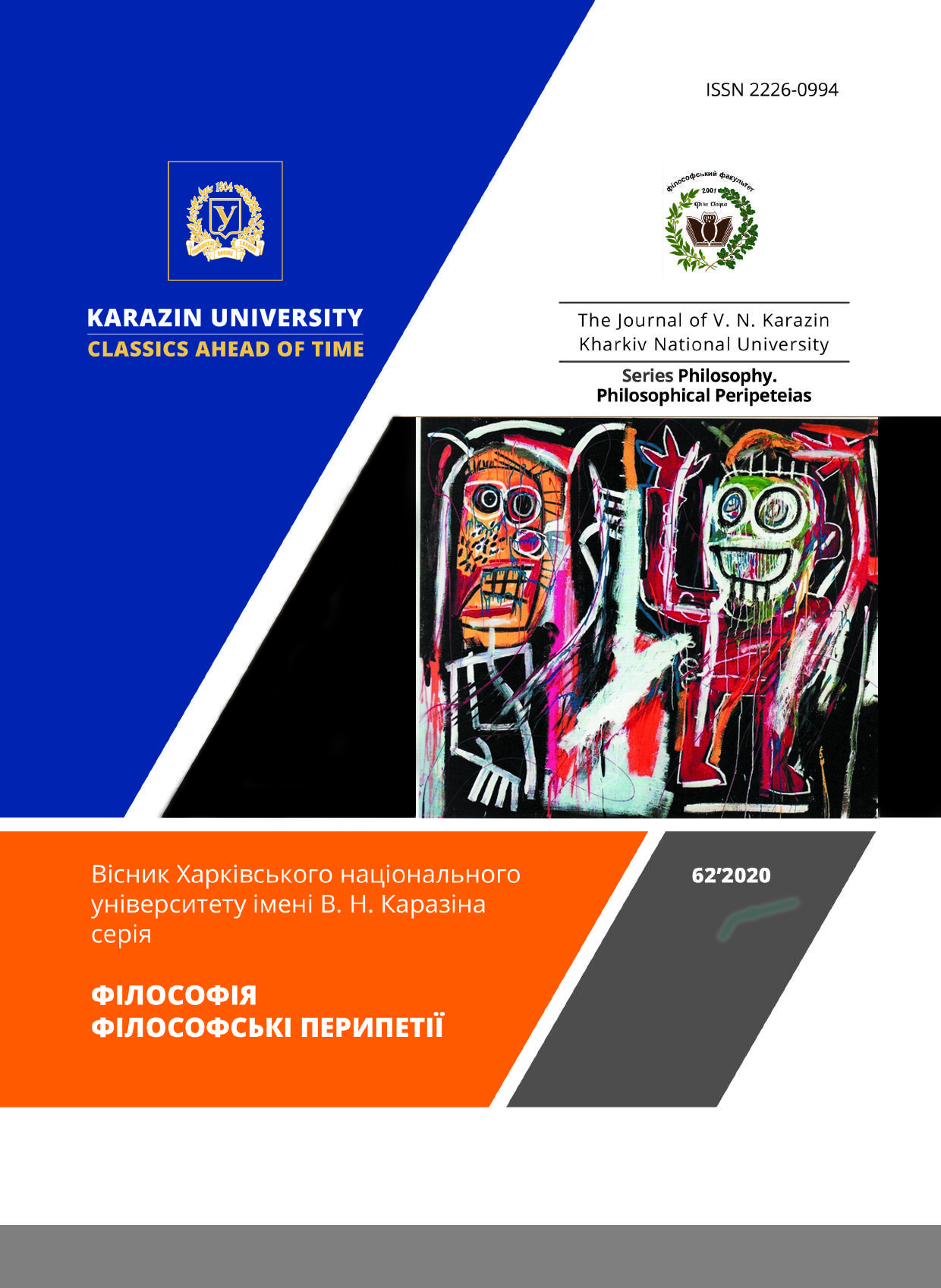SHAKESPEARE’S THEATER OF LIFE AND PHILOSOPHY OF BAROQUE THEATER: «FAUSTIAN SPIRIT» OVERTAKES ANCIENT FORM
Abstract
Purpose of the article is to identify the components of creative method and anthropology of Shakespeare’s theater, to compare Shakespeare’s theater to Baroque theater, to analyze various conceptions of Shakespeare. Methods: hermeneutic, cultural anthropology, historical and cultural, analytical, psychoanalysis. From philosophical and anthropological positions, creative method and creative works of W. Shakespeare have been analyzed, a strong connection of theater and philosophy of Shakespeare’s theater with Baroque theater has been revealed (mysticism, fabulousness, hyperrealism, formal features are replaced by effective ones, usage of parable and utopia (image of King Lear in particular), motives of vanitas (vanity), duality of the world, allegory, «figureness»). Shakespeare suggests a new philosophy of theater based on elimination of borders between reality and art, «baroqueivisation», theatricalization of reality, masks are used as symbols of a real person without distorting it but rather revealing his or her deepest essence, sincerity. It is also reflected in understanding of Shakespeare’s authorship problem where mask of a clown and a buffoon are used in order to convey the deepest and most philosophical thoughts to society. Baroque reform of the theater suggested by Shakespeare, reduces theater to universal anthropological model both synchronically and diachronically. Theater runs around the actor, not only art but life of the universe is carried out via actor. This new philosophy of theater cannot be considered only within the «culture of meanings» (G.U. Gumbrecht) but on principle is within the limits of «culture of presence», which helps to understand the ideological idea of Shakespeare’s theater, to view biography and personality of Shakespeare in a new way because Shakespearean Studies was within the culture of meanings and tried to consider only the hidden codes and symbols of Shakespeare’s theater. Beyond these philosophical hermeneutics remained the transforming, effective power of Shakespeare’s theater. Humanization of theater also takes place: based on the old Antique form a new humanistic content is built, where much attention is paid to «life of soul», love, kindness, wits, passion, vengeance, etc., sinfulness of a soul and its ability to clear of evil. Theatre is considered to be not an external spectacle but a deep instrument of immersion in life of a soul and its gradual growth. Since theater is the whole world (in philosophy of culture it can also be identified with the formation of «Faustian soul» (O. Spengler), «Faustian spirit» focused on the infinite formation, the infinity of space), it requires the creation of a corresponding dictionary because the word itself becomes a word-action. A special role of allegory genre for philosophy of Shakespeare’s theater is considered, his philosophy is compared to philosophy of F. Bacon.
Downloads
References
Ackroyd, P. (2006). Shakespeare: The Biography. London: Vintage. 530. (in English).
Bacon, F. (1978). Essays in 2 volumes / Compiled, common. ed. A. Subbotin; USSR Academy of Sciences. Vol.2. Moscow: Thought. (In Russian).
Bloom, H. (1999). Shakespeare: The invention of the Human. New York: Riverhead Books. (рp.19-45). (in English).
Bloom, H. (2008). Heims, Neil (Ed.). King Lear. Bloom’s Shakespeare Through the Ages. Bloom’s Literary Criticism. New York: (рp.7-10). (in English).
Dalaqua, G. H. (2020) Aesthetic injustice. Journal of aesthetics and culture. 2020, Vol. 12. Рр.1-2, DOI: https://doi.org/10.1080/20004214.2020.1712183
Fischer-Lichte, E. (2018) Philosophical Theatre: Some Reflection on the Concept. Anglia. 2018. Vol. 136. Issue 1. (рp.43-60). DOI: https://doi.org/10.1515/ang-2018-0008
Gililov, I.M. (1997). A game about William Shakespeare, or The Mystery of the Great Phoenix. Moscow: Artist. Director. Theater, 1997. (In Russian).
Grady, H. (2001). Modernity, Modernism and Postmodernism in the Twentieth Century’s Shakespeare. In. Bristol, Michael; McLuskie, Kathleen (Eds.). Shakespeare and Modern Theatre: The Perfomance of Modernity. New York: Routledge. (pp.20-35). (in English).
Gumbrecht, G.U. (2020). Presence production. What value can not pass / trans. from English I. Ivashchenko. Kharkiv: IST Publising, 2020. (In Ukrainian).
Herman, B. (2008). Portrait of Shakespeare, or the Personal Case of Francis Bacon. Moscow: Arthouse Media.2008 (In Russian).
Herman, W. (2007). About the personality of Shakespeare-author. Image and thought Vol. 29. 2007. (pp.4-11). URL: http://lit-obraz.narod.ru/Vipusk29/grmn29.htm (In Russian).
Litvinova, M. (2011). He sowed the «Storm». URL: https://rg.ru/2011/01/30/shakespear-poln.html
Mays, A.&Swanson, J. (2016). Shakespeare Died a Nobody, and Got famous by Accident. New York Post, 20 April 2016, Retrived 31 December 2020. (in English).
Shakespeare’s Question (2021). URL: https://uk.m.wikipedia.org/wiki/ %D0%A8%D0%B5%D0%BA%D1%81%D0%BF%D1%96%D1%80%D1% 96% D0% B2% D1% 81% D1% 8C% D0% BA% D0% B5_% D0% BF% D0% B8% D1% 82% D0% B0% D0% BD% D0% BD% D1% 8F (In Ukrainian).
Spengler, O. (1998). Sunset of Europe. Essays on the morphology of world history. Moscow: Mysl. Vol.2. (In Russian).
Ukrainian Shakespeare Portal (2020). URL: shakespeare.znu.edu.ua // http://shakespeare.in.ua/en (In Ukrainian).
Wilson, R. (2004). Secret Shakespeare: Studies in Theatre, Religion and Resistance. Manchester: Manchester University Press. 326. (in English).
Copyright (c) 2021 Олена Титар

This work is licensed under a Creative Commons Attribution 4.0 International License.
Authors who publish with this journal agree to the following terms:
- Authors retain copyright and grant the journal right of first publication of this work under the terms of a license Creative Commons Attribution License 4.0 International (CC BY 4.0).
- Authors are able to enter into separate, additional contractual arrangements for the non-exclusive distribution of the journal's published version of the work (e.g., post it to an institutional repository or publish it in a book), with an acknowledgement of its initial publication in this journal.
- Authors are permitted and encouraged to post their work online (e.g., in institutional repositories or on their website) prior to and during the submission process, as it can lead to productive exchanges, as well as earlier and greater citation of published work.






3.gif)




